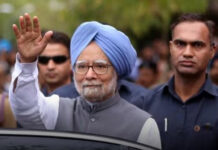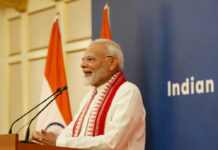New Delhi, Mar 03: The Prime Minister, Shri Narendra Modi, today addressed the seventh session of the post-budget webinars being organised by the Government of India to consult and encourage the various stakeholders to help fully implement the themes of the budget in a time-bound manner. Today’s webinar was on the theme of `technology-enabled development’.
Setting the tone for the day-long programme, Prime Minister emphasized that science and technology is not an isolated sector for the current Government. In the field of economy, the vision is linked with areas like the digital economy and fintech. Similarly, advanced technology has a massive role in infrastructure and public service delivery-related vision.
“Technology for us is a medium to empower the people of the country. For us, technology is the mainstay of making the country self-reliant. The same vision is reflected in this year’s budget as well”, he said. He talked of US President Joe Biden’s latest address to underline the importance of ‘Aatmanirbharta’ as developed countries like the USA are also talking about this. “In the light of emerging new global systems, it is critical that we move forward with a focus on Aatmanirbharta”, he said.
Mr Modi highlighted the Budget’s emphasis on sunrise sectors like Artificial Intelligence, geospatial systems, drones, semi-conductors, space technology, genomics, pharmaceuticals, and clean technologies to 5G. He noted that the budget lays down a clear roadmap for 5G spectrum auction, and Production Linked Incentive (PLI) schemes have been proposed for design-led manufacturing related to a strong 5G ecosystem. He asked the private sector to increase its efforts in this area.
Referring to the dictum ‘science is universal, and technology is local’, the Prime Minister said, “We are familiar with the principles of science, but we have to emphasize on how to make maximum use of technology for ease of living.” He mentioned the investments to be made in house constructions, railways, airways, waterways, and optical fibres and called for ideas for the best use of technologies in these critical areas.
Noting the expanding global market for gaming, he pointed out that the budget has focussed on Animation Visual Effects Gaming Comic (AVGC). Similarly, he stressed the need to have games adapted to the Indian milieu and needs.
He emphasised the centrality of communication centres and fintech and called for an indigenous ecosystem with less foreign dependence for both sectors. He also urged the private sector to take maximum advantage of the changes in the rules for using geospatial data and the infinite opportunities that have emerged due to the reform. “The world has seen our reliability from our self-sustainability to vaccine production at the time of Covid. We have to replicate this success in every sector”, Prime Minister Modi said.
He also emphasized the importance of a robust data security framework for the country and asked for a roadmap for setting standards and norms for that.
Referring to the Indian startup ecosystem, the Prime Minister assured the sector of full support from the government. “A portal has been proposed for skilling, re-skilling and up-skilling of youth in the budget. With this, youth will get the right jobs and opportunities through Application Programming Interface (API) based trusted skill credentials, payment, and discovery layers”, he informed.
He further highlighted the Rs. 2 lakh crore worth PLIschemes in 14 key sectors to promote manufacturing in the country and urged the various stakeholders to provide practical suggestions in the areas like the use of optical fibres in the citizen services, e-waste management, circular economy, and electric mobility.
In the webinar, the Office of Principal Scientific Adviser to the Government of India in association with scientific ministries and departments has brought together leading academics, industry experts, and policymakers for structured deliberations on budget-induced interventions to realise the specific focus on the promotion of technology-enabled development in this year’s budget.
The deliberations dwelt mainly on S&T initiatives in prominent technology areas; potential for job creation/boosting employability; technological self-reliance; a plan for achieving the vision of AmritKaal/ India in 2047 (when it will celebrate 100 years of Independence: and course of action to reduce compliance burdens.
The webinar included four thematic breakaway sessions led by the Department of Telecommunications (DoT), Department of Scientific and Industrial Research (DSIR), Department of Science and Technology (DST), and the Ministry of Electronics and Information Technology (MeitY). The sessions had participants from various Ministries and Departments of the Government of India, academia, and industry. (India Science Wire)





















